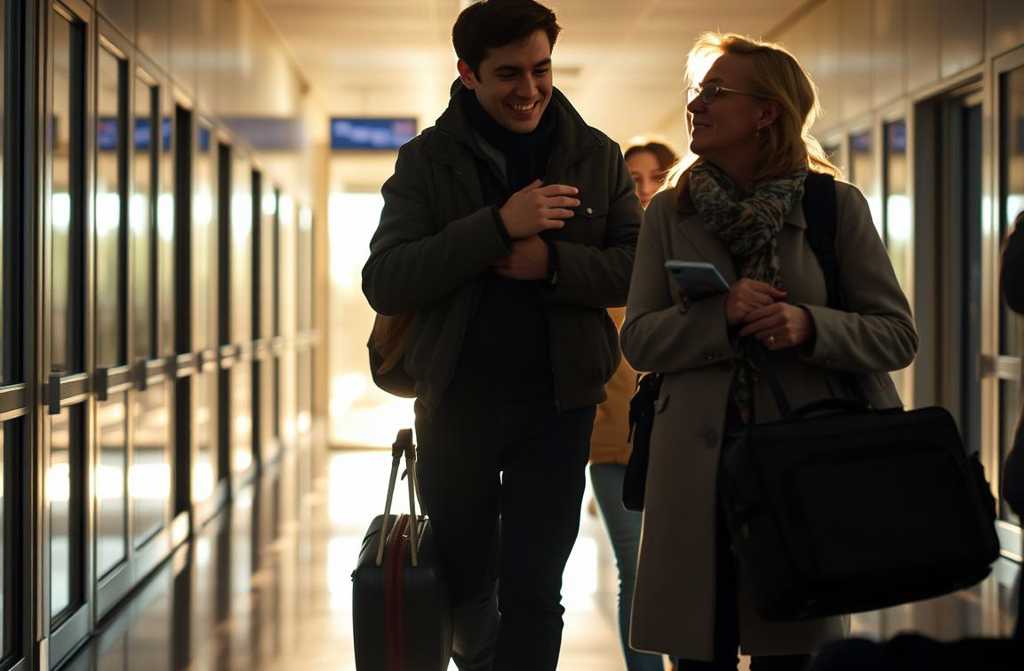The Return Home
James tightened his seatbelt and absently adjusted the seatback. He flew oftentoo often, if he was honest. Once a month, sometimes more: conferences, meetings, short business trips that left his head spinning worse than cheap whisky. This time, it had all been especially routine: two days of negotiations, signatures, a dinner with partnersand then back to London.
The only difference was the destination. The plane wasnt heading to Germany or Manchester, but to a small town in the south where hed been born and had run away from twenty years ago. Hed only been back twice sinceonce for his fathers funeral, then for his mothers grave. Both times, hed been desperate to returnto the noise of London traffic, to his projects, to a life too busy for reflection.
He leaned back and closed his eyes. Last night, hed sat in a bar with colleagues, arguing over some presentation. Someone had drunk too much and started singing *Wonderwall* on a guitar. Funny how that tune had stuck in his head now, humming faintly beneath the drone of the engines. He nearly smiled.
“Excuse me, would you like juice or water?” The stewardess bent toward him, a practised smile on her face.
“Water, please.”
She handed him a plastic cup. He nodded. The water was lukewarm, as if left in the sun. But he was thirsty.
The man beside him muttered something while flipping through a magazine.
“Prices are mad, arent they?” He glanced up.
“They always are,” James replied. “Selling watches here for the price of a flat.”
They both smirked, and for a moment, it felt easy, almost familiar.
The plane hummed steadily, rocking gently. A baby cried somewhere ahead, but the mother hushed it quickly. Someone clicked the overhead light on and off, chasing the glow. A girl across the aisle giggled at her phone, the screen casting a pale light on her face, making her look younger than she was.
James turned to the window. He half-expected to see the faint glow of a village below, a strip of motorway, the flicker of a star. But outside was just darknessthick, matte, like black film pressed against the glass.
“Dark out there, eh?” The man beside him peered over his shoulder. “Cant see a thing.”
James shrugged. “Well its night.”
But something uneasy stirred in his chest. Night breathed. This was just emptiness.
He checked his phone out of habit. The screen flashedno signal.
Of course. The plane. What did he expect? He always forgot. Still, the reflex remained: reach for the screen, hope for a message from his son. *At least send an emoji*, he thought, locking the phone with a wry smile.
“Youve got no signal either?” the man asked.
“None,” James said. “Not supposed to up here.”
“Right.” The man went back to his magazine, tracing his finger over glossy ads for expensive jackets as if he could feel the fabric.
The plane wobbled slightly, like a hand nudging it from below. Just turbulence, James told himself. But his cup trembled, ripples spreading too evenly, as if tapped by an invisible finger.
From a few rows ahead, a womans voice: “Youre sure theyll meet us?”
“Of course, I called. They said theyd wait right by the gate,” another replied.
The word *wait* stuck in his mind. James pressed his forehead to the window. Still nothing. No glimmer, no light. Just black cloth stretched tight around the plane.
He thought of his mother. The one lying in the old churchyard outside town for over a decade now. He remembered standing at her grave in his black coat, the earth so wrong when her laughter still echoed in his head. Now, staring at the window, he almost heard it again*Jamie*and flinched like hed been shocked.
“Alright there?” The man beside him again.
James blinked. “Just remembering something.”
“Ah.” The man nodded. “Well, best not think about the turbulence.”
He tried reading, but the words slipped away. The lines blurred, and he found himself staring not at the page but at the dark glass. Blackness. Normal, surely. What else was there to see?
The man turned a page and chuckled dryly. “Six grand for a watch. Could buy a used Fiesta for that.”
“Yeah,” James said, smiling politely despite the joke falling flat.
Across the aisle, another conversation:
“She said, Wait for us by lunchtime.”
A higher voice chimed in: “Mine said the same. Wait for us by lunchtime.”
A coincidence, surely. Just two passengers repeating the same phrase. But the word *wait* sent a chill through him, like a door left open to a draft. He stared back at the window.
The black glass reflected his facepale, tired. No clouds, no lights below. Just smooth darkness, so dense it felt like reaching out would make his fingers vanish.
“Dark out there, eh?” The man again, peering. “Cant see a thing.”
“Its night,” James said aloud. But inside, the words twisted: night was alive. This was dead.
He set the book down, sipped the warm water, and rolled his eyes. The plane was full, yet it felt like sitting in a basement.
The trolley rattled past. The stewardess leaned toward the next row.
“Coffee or tea?”
“Tea, please. And lemon, if youve got it,” a woman said.
Her friend added, “Same. Tea with lemon.”
They said it identically, as if rehearsed. James wondered if hed misheard, but a girl in headphones giggled and mimicked in a singsong voice: “*With lemon, with lemon*”
The man beside him stopped flipping pages, frowned, but said nothing.
The plane shuddered. Water trembled in the cup, ripples fine as mesh. James touched the surfaceit stilled, like glass. Strange, but he brushed it off. Fatigue, that was all.
***
Captain Harris glanced from the instruments to the windshield. There was nothing. Even on moonless nights, clouds parted, horizons glowed, stars seeped through. This was a black screen, as if the cockpit had been left in a hangar with the lights off.
“Maybe were in clouds,” he said aloud, voice wavering.
“At this altitude?” The co-pilot looked up. “With no turbulence? Radars blank.”
“Electromagnetic storm,” Harris suggested. “Solar flares, plasma layers happens.”
“Then thered be interference.”
“There is.” He tapped the silent radio.
He knew he wasnt convincing. This wasnt like any glitch hed seen in twenty years.
The co-pilot pressed his forehead to the side window.
“Maybe snowfields below? We just cant see them?”
“Snow glows,” Harris said. “This is just black.”
They did what they always did in uncertainty: checked the instruments again. Course steady. Altitude stable. Fuel normal. Engines perfect. Everything workedexcept the world outside.
“You know,” the co-pilot said quietly, “if it were a storm, Id understand. Or the ocean. But this isnt night. Night breathes.”
“Breathes,” Harris agreed, staring into the void.
He told himself: *Weve just lost landmarks. Well pick up a beacon, land, carry on.* But the words wouldnt form. As if the emptiness outside muffled thought too.
Finally, he reached for the mic. But “everythings fine” wouldnt come.
“Ladies and gentlemen,” he said hollowly, “we are continuing our flight. Navigation systems are temporarily unavailable, but the aircraft is functioning normally. The crew has the situation under control.”
He released the button.
Silence hissed in his headset. Outside, the black wall held them, as if waiting for the fuel to run out.
***
The PA clicked off. A basement-thick silence followed, then crackednot in the instruments, but in the people.
The man beside James snapped his magazine shut, shoved it into the seat pocket. His face tightened.
“Under control?” he said too loudly. “Whats temporarily unavailable mean? Are we lost?”
No one answered. But heads turned.
Across the aisle, a girl in a jumper with rabbits stuffed her phone into her bag and cried. Not hysterically, but dryly, shivering. A stranger handed her a tissue. She crumpled it without using it.
A few rows ahead, a man in a sharp suit pressed the call button. When the stewardess came, he barked:
“Explain no navigation. I demand contact with the ground! I have a connecting flightmy whole schedules ruined!” She whispered assurances, but he waved her off. His voice shook. *Fear*, James thought. Hiding behind anger.
The young mother whod soothed her child earlier sat rigid now, stroking his hair too often, as if her touch could save him. Her eyes were dry, watch







